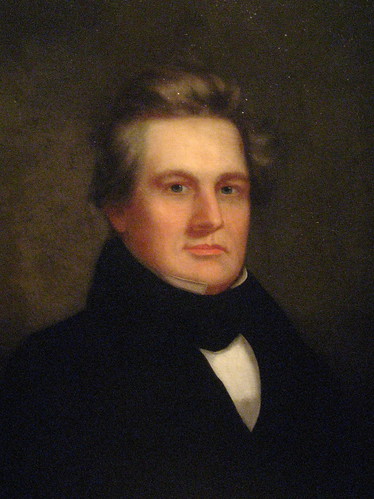 So did you know that in the election of 1856, Millard Fillmore ran as the presidential candidate of the Know-Nothing party? One of the nation’s first major third parties, the Know-Nothing party was formed partly in response to large numbers of Irish and German immigrants arriving in the United States.
So did you know that in the election of 1856, Millard Fillmore ran as the presidential candidate of the Know-Nothing party? One of the nation’s first major third parties, the Know-Nothing party was formed partly in response to large numbers of Irish and German immigrants arriving in the United States. Facing starvation during the Great Potato Famine, hundreds of thousands of Irish immigrants moved to New York and other large northeastern cities in the late 1840s and 1850s. Willing to work for low wages in unskilled jobs, Irish immigrants seemed to be taking jobs away from native-born Americans.
Around the same time, large numbers of Germans were immigrating to the United States. Like the Irish, most Germans were Catholic and "didn't keep the Sabbath" the way American Protestants did. They also seemed to drink lots of beer, which offended many Americans who still "clung to traditional Puritan values."
Although the Know-Nothing party quickly faded away, the Irish and German remained and introduced many traditional ethnic foods to the United States, including spätzle, saurkraut, pretzels, pumpernickel bread, Irish Stew, corned beef, coddle, and goodey.
Mashed Potato Pancakes are another popular Irish and German dish. And while no one knows today if President Fillmore ever ate them, he surely would have enjoyed these Garlic Mashed Potato Pancakes from Cat Cora at Oprah.com:
5 large baking potatoes
8 Tbsp. (1 stick) unsalted butter
2 cloves peeled and minced garlic
2 cups low-fat milk
3 tsp. salt
Freshly ground black pepper
Bring a large pot of water to a boil and add 2 teaspoons of salt. Peel the potatoes and cut them into 1-inch cubes. When the water is boiling, add the potatoes and cook until tender, about 10 to 12 minutes.
While the potatoes are cooking, heat the butter in a medium skillet. When the butter is melted, add the garlic. Cook over low heat just until the garlic starts to color. Take care not to burn the butter. Take pan off heat and set aside to cool.
When the potatoes are easily pierced with a fork, drain them and return them to the pot. The residual heat will help the excess water evaporate. Mash the potatoes with a potato masher or a ricer. Gradually add the milk until the potatoes are the desired consistency.
Stir in the butter and garlic mixture, add the remaining 1 teaspoon salt and pepper to taste. Form the mixture into pancake patties and cook on each side for about 1 to 2 minutes over medium-high heat in skillet on stove top until a bit crisped on both sides. Serve warm and enjoy!
FAST FACT: According to the Oxford Advanced Learners Dictionary, the Know-Nothing Party "is the popular name for the American Republican Party, later called the American Party, which was established in 1843 with the aim of restricting immigration and preventing Roman Catholics from holding public office. They were called Know-Nothings because members of the party were told to say ‘I know nothing’ when asked about it. They were also called ‘nativists’ because they believed that foreign-born Americans should not be allowed to hold government posts." Know-Nothings scored some victories in the 1850s, but were divided over the issue of slavery, and the party soon faded away.
To read an excerpt of my new book click here

